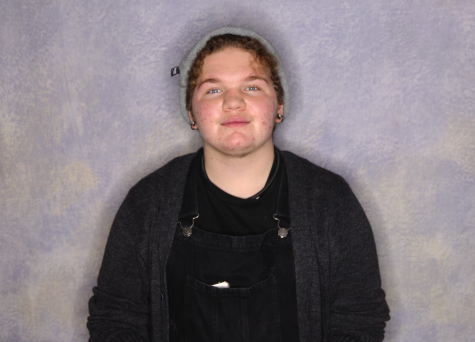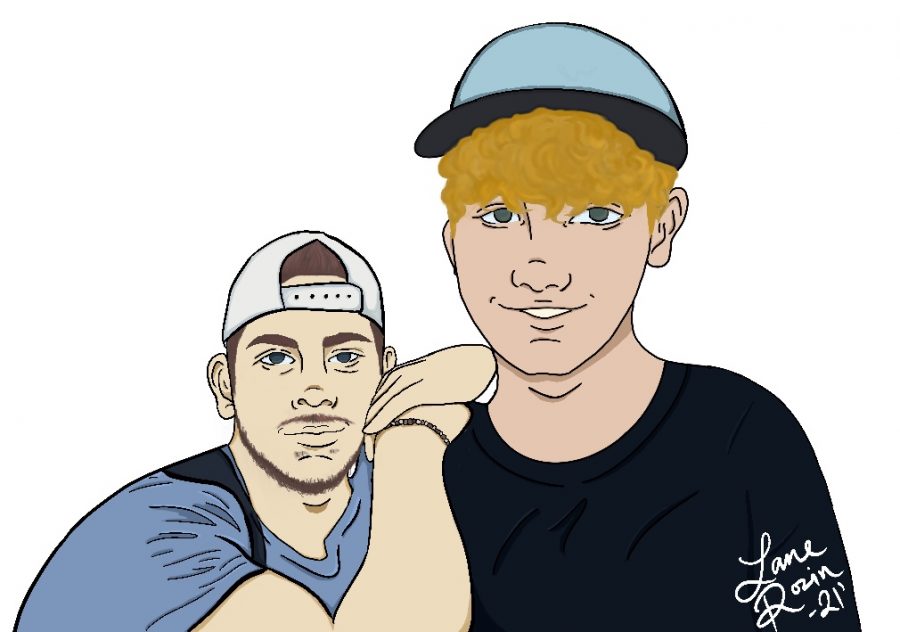A place to call home: Sophomore Hayden Murphy shares his experiences with being in non-parental care
Photo by: Lane Phifer
Above is an illustration of sophomore Hayden Murphy and his brother Bryce Murphy.
“You know you’re not doing something right if you’re not willing to die tomorrow,” sophomore Hayden Murphy says to himself as he gets out of bed like he has every morning for the past two and a half years as a reminder to make a list of things he would accomplish for the day.
The first thing on his list is to go to school, the second is to spend time with his friends, and the third is to go to the Young Men’s Christian Association (Y.M.C.A.) to do what he loves most — play basketball.
Since the age of eight, Hayden has spent most of his life on the basketball court. Whether it was at practice, a game, or simply because he needed to clear his mind.
According to Hayden, the sport has aided him in distracting himself from his life at home over the years.
For the past eight years, Hayden has been in non-parental care, which is when a child is in the care of an adult other than a parent for half a day, more per week, or regularly.
According to the National Survey of Children in Nonparental Care (NSCNC), there are roughly 2.3 million children in the U.S. that live with neither their biological or adoptive parents, but rather with relatives or nonrelatives in foster care or less formal care arrangements outside the foster care system.
“Every day after school, I immediately go to the YMCA and play basketball. It’s like a video game, you’re in an alternate reality where real-world issues don’t matter as much because you’re so caught up in the game,” Hayden said. “When I’m playing basketball, I don’t have to think about my life at home. Time just flies by.”
As of Dec. 2020, Hayden has been in his older brother, Bryce Murphy’s custody after several years of being in the care of his relatives, a previous coach and friends.
In a survey conducted by the NSCNC, 63.1% of children in nonparental care lived with grandparents, 14.7% lived with foster parents (some of whom were related) while the remaining 22.3% stayed with other relatives and nonrelatives such as aunts, uncles, godparents, or friends.
When Hayden was eight, his mother was sent to prison and as a result of his biological father being absent, he fell into Bryce’s father’s care until his eighth-grade year. However, over time, Hayden’s experience in the home became unsteady.
According to the article, “Children in nonparental care: health and social risks,” the parent is a threat to the safety of the child as a result of incarceration, deployment, death, or the parent is lacking resources to care for the child.
“When I was living with Bryce’s dad, he was never home. We always fought and there wasn’t food in the kitchen a lot of the time. Sometimes all I would eat was ramen and it had gotten to the point my eighth-grade year where I was eating raw spaghetti when I got home,” Hayden said. “I was always worried as to where my next meal was going to come from and because of that, Bryce would sometimes have to buy us groceries to make sure we had something to eat.”
By the time that Hayden was in the second grade, he resorted to sports such as football and basketball in order to avoid being at home.
“I fell in love with sports and it gave me a way to free my family from their situations. For me to pass the love and one of the only things I’m good at in life to Hayden was a no-brainer,” Bryce said. “I knew if he could connect himself to something bigger than himself, then he would make something of himself. Basketball was his way out of the bad and his way to free himself.”
Because of Hayden’s love for basketball, he decided to join the Neosho Youth Basketball Association-Boys Division his third-grade year, where he was mentored by Bryce’s previous football and basketball teammate, coach Logan Stuart.
Hayden was a member of the traveling team for roughly four years and during that time, his relationship with Stuart grew.
Once Stuart was informed of Hayden’s home life, he decided to offer Hayden a safe place to live the summer leading up to his freshmen year.
“When my coach offered me a place to live to get out of my current situation, both he and I knew it was a good idea for me to move in with him because of how my life was at home,” Hayden said. “At the time, I saw it as an opportunity for a better life and didn’t want to pass it up. I’m glad I had the support system I had to get out of the situation I was in.”
Prior to moving in with Stuart and his family, Hayden had been couch surfing and worried about when his next meal would be.
“Hayden has been in a very difficult situation that no kid should go through and I knew I wanted to get him out of it. He had been couch surfing for several weeks at some of his friends’ houses, I was 19 and still lived with my parents at the time and when I asked them if Hayden could come to stay with us, they were happy to welcome him into the home,” Stuart said. “When he came to move in with us, he came to our house with a can of green beans because he was so worried as to where his next meal would come from. Seeing a 14-year-old have that kind of mindset made us realize he needed unconditional love and help to get him on the right track.”
Throughout his time with the Stuart family, Hayden’s grades and health began to improve as a result of his dedication to basketball.
“For me, if it wasn’t for basketball, I would probably be a high school dropout or not doing well in my classes. Before my eighth grade year, I had terrible grades on and off, but no one cared. I didn’t care. Dad didn’t care,” Hayden said. “But then sometime during eighth grade, I was getting A’s and B’s because I wanted to do well in school so that I could play basketball.”
However, towards the end of the year he stayed with Stuart, his behavior began to change and because of this, Hayden took it upon himself to move back into Bryce’s father’s house.
Shortly afterward, Hayden received an offer from his cousins to stay with them, which only lasted for four m onths.
Hayden eventually began to feel out of place with the household and as a result, he spent two months couch surfing at his friend’s houses. When the stress of finding somewhere to stay began to affect Hayden’s grades, Bryce decided to take him in.
“One day I got a call that Hayden’s grades were slipping and that my dad and one of the people Hayden was living with decided he was going to go to boarding school. With no hesitation, I said that I would rather have Hayden than anyone or anything else,” Bryce said. “The school principals and counselors told me that that would be a bad decision and that it would ruin my dreams and hopes for life, but I knew they would be wrong.”
Since Hayden moved in with Bryce, their relationship has strengthened and his academic career has improved.
“Hayden was in a bad situation, but he has improved in almost all aspects of life. His grades have gotten better and he has a support system here. Hayden has gained good weight and from what he’s told me he likes being around me and my Pittsburg family,” Bryce said. “Seeing Hayden grow and hearing his teachers love Hayden as a person, and having the counselor call and tell me how glad she is that Hayden moved into town.”
While Hayden’s journey has been challenging, he prefers to think of it as something that has benefited him.
“Everything that’s happened to me is who I am and what I’ve been all my life, but I’m always improving,” Hayden said. “Throughout the past several years, I learned that a lot of people put me before themselves and that I have a huge support system. I’ve taken it all in as an opportunity for something better.”
Your donation will support the student journalists of Pittsburg High School - KS. Your contribution will allow us to purchase equipment and cover our annual website hosting costs.

This is senior Lane Rozin Phifer's fourth year of being apart of the Pitt Media staff along with his second year of being Multimedia Editor. Lane is also...





